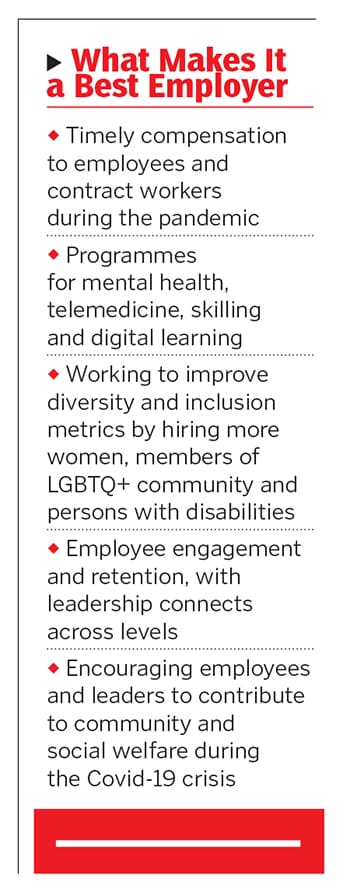
India's Best Employers: Bayer, putting safety and security of employees first
In a pandemic year, Bayer stepped up by not only realigning communication and leadership strategies, but also trying to improve financial security, safety standards and inclusion for employees
 D Narain, senior Bayer representative, South Asia, was heartened to see employees taking charge in many situations during the pandemic to ensure smooth functioning
D Narain, senior Bayer representative, South Asia, was heartened to see employees taking charge in many situations during the pandemic to ensure smooth functioning
Being a pharmaceutical and crop science company working in the areas of agriculture, health and nutrition, Bayer was categorised as an essential services organisation in the early days of the Covid-19 pandemic.
D Narain, senior Bayer representative, South Asia, says in the wake of the nationwide lockdown, the company leadership rushed to put up a digital infrastructure to enable work from home, while ensuring uninterrupted operations in factories and enhanced safety norms for employees. The mandate of the leadership task force was cut out, when Narain saw a heartening development: Employees taking charge. “In a number of situations, we [leaders] did not even have to step in. The factory managers rolled up their sleeves and empowerment across levels kicked in without even us having to tell them what to do,” he says. “It was as if employees wanted to take personal responsibility during the Covid-19 crisis to make sure that we, as a company, did not drop the ball.”
The 125-year-old Germany-headquartered Bayer, with its India corporate office located in Mumbai, has made it to the list of India’s Best Employers yet again. In India, Bayer’s crop science division provides modern agricultural solutions to nearly 2 crore farmers, in key crops such as rice, corn, cotton, fruits and vegetables. Its pharmaceutical division is a joint venture with Cadila Healthcare, and is called Bayer Zydus Pharma. It focuses on therapies like cardiology, women’s health, ophthalmology and oncology.
The organisation with 4,390 full-time employees has a 12 percent annual growth rate. According to human resources and management consultancy company Kincentric, Bayer has a revenue size between $500 million and $1 billion. Its attrition rate is only 4 percent, with employee opinion scores ranking the organisation higher than industry standards on various parameters. For instance, Bayer’s employee engagement score stood at 83 percent, as against an industry benchmark of 71 percent. Indices for agility and engaging leadership were at 79 percent and 77 percent respectively, also surpassing industry standards.

“Bayer in India must not have been impacted much during the pandemic, since agricultural activity did not drop, except for minor fluctuations in terms of channel inventory not coming through, raw material supply issues, etc. But from a demand perspective, they would not have seen any adverse influence,” says Vishal Manchanda, research analyst with Nirmal Bang Institutional Equities Research. “Even on the pharma side, if we talk about Xarelto, the most important product in their portfolio, it might have been impacted from a growth perspective, but underlying demand should have been intact. Those who take the medication would have continued taking it even through the pandemic.” Xarelto is Bayer’s brand name in the Indian market for Rivaroxaban, an anticoagulant to treat and prevent blood clots.
Therefore, in the previous year, Bayer not only managed to keep financial security of its employees intact, but also added to its workforce. “We did not make any changes to salaries and ensured they are paid on time, which was the first concern of our employees when the pandemic hit. In fact, we also went ahead with planned promotions and short-term incentives,” says KS Harish, country group HR head, South Asia, Bayer. The company also increased health insurance coverage for employees and extra protection for their parents.
Apart from initiatives to address mental stress of employees during the pandemic, the company also offered telemedicine services. Narain adds that Bayer ensured uninterrupted bi-weekly payments to their contract workers through the lockdown, and encouraged them to pay it forward to their staff. “They [contract workers] were among the segments of the population most impacted by the pandemic and we took decided to not stop compensating them even when things had come to an abrupt halt because of the lockdown,” he says.
According to Kincentric data, only about 11 percent of Bayer’s full-time employees are women, with the number of women managers in the company standing at 13 percent. The company is making conscious efforts to improve on diversity and inclusion in its workforce, Harish says.
“ We did not make any changes to salaries, and ensured employees are paid on time. We also went ahead with planned promotions and short-term incentives.”
KS Harish, country group HR head, South Asia, Bayer
The global aspiration of the company is to have a 50 percent female workforce as an average across all combined management levels by 2030, he adds. “That is also our local aspiration, because a diverse workforce has a strong business case.” Harish explains that it is often a challenge to get top talent of women in the life sciences space. “More than 50 percent of students in agricultural universities are women, but we do not see them coming into the industry as they take up research or government jobs. So this is an area we are trying to improve.”
The company is working with government bodies to promote training and skilling of women in the crop science and pharmaceutical spaces. “This year, we hired more than 500 people, in which over 200 were women, including senior managers and leaders. If we keep up this pace for the next two to three years, it will make a significant difference to our employee gender ratio,” Harish says, adding that the company is also conscious about hiring members of the LGBTQ+ community, acid attack survivors and persons with disabilities. Bayer also runs an unconscious bias recognition programme in order to create a more inclusive workplace.
(This story appears in the 30 November, -0001 issue of Forbes India. To visit our Archives, click here.)







